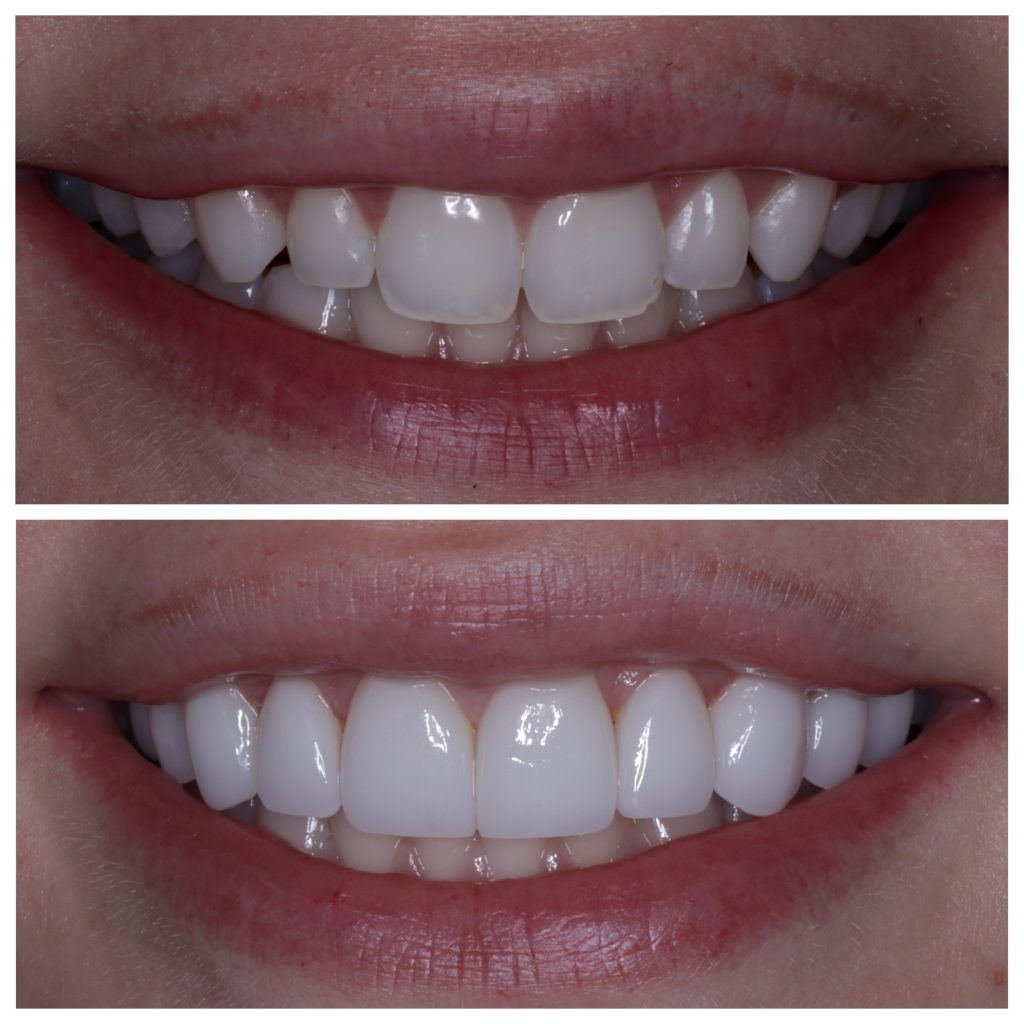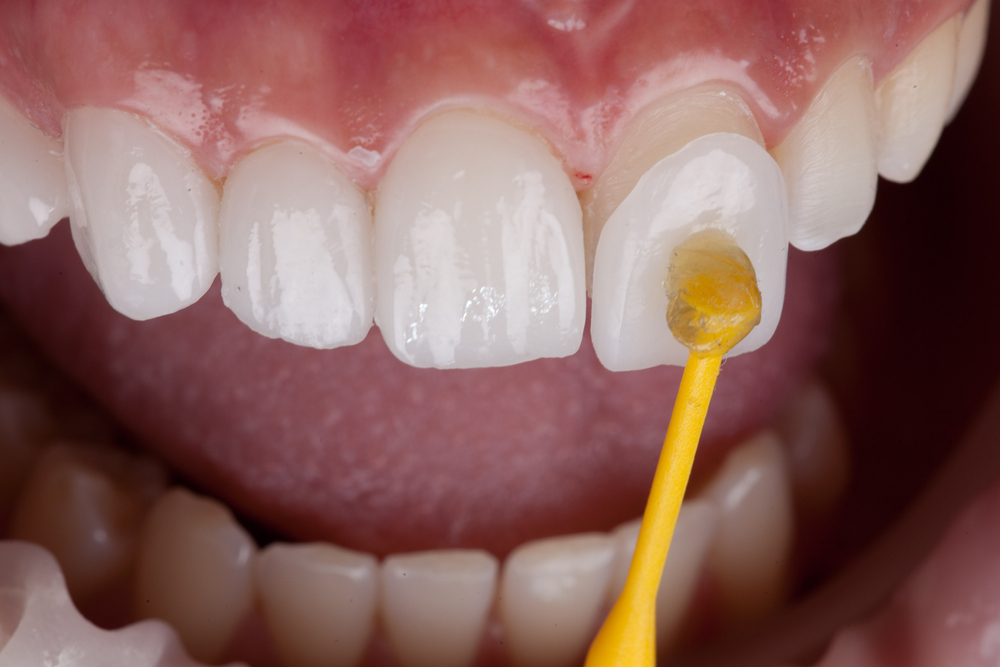How Dental Veneers Can Correct Imperfections Like Gaps and Chips
The Full Introduction of Veneers: Types, Makes use of, and Their Effect on Your Smile
Veneers function as a prominent remedy for people seeking to improve their oral aesthetics. These custom-crafted shells can successfully mask blemishes such as discoloration and gaps. With two primary kinds available, porcelain and composite material, each offers distinct benefits and constraints. The effect of veneers extends past mere look, affecting self-worth and social interactions. Recognizing their advantages and kinds is crucial. What might this imply for one's overall lifestyle?
Understanding Veneers: What They Are and How They Work
Veneers are thin coverings, usually made from porcelain or composite resin, that are custom-crafted to fit over the front surface area of teeth. They serve both useful and visual functions, offering a service for numerous oral blemishes such as discoloration, voids, and small imbalances. By sticking to the tooth enamel, veneers develop a natural appearance while boosting the form and color of the teeth.
The process generally includes a first assessment, where a dental professional assesses the client's needs and goes over wanted outcomes - Dental Veneers. Following this, a very little amount of enamel might be removed to suit the veneer. Impressions of the teeth are then required to guarantee an exact fit. When fabricated, the veneers are bonded firmly to the teeth using a special dental adhesive. This treatment not just enhances the smile's look but additionally helps shield the underlying teeth from more damages, making veneers a preferred option for several looking for a smile transformation
Kinds of Veneers: Porcelain vs. Composite Resin
The difference in between porcelain and composite resin veneers hinges on their material make-up and attributes. Each kind offers varying levels of cost, durability, and resilience, influencing patients' options based on their private needs. Comprehending these distinctions is crucial for making an educated choice pertaining to dental enhancements.
Material Differences Explained
While both porcelain and composite resin veneers offer the exact same cosmetic purpose, they vary greatly in material residential or commercial properties, longevity, and aesthetic end results. Porcelain veneers are crafted from a ceramic product that resembles the all-natural translucence of teeth, providing a realistic appearance. Their smooth surface is immune to discoloration, making them an attractive alternative for those seeking a long-lasting visual. In comparison, composite material veneers are made from a tooth-colored plastic product, using convenience and ease of application. They might not achieve the exact same degree of brightness or translucency as porcelain. In addition, composite veneers can be a lot more conveniently shaped and repaired, making them a more versatile option in certain oral situations. Each type offers unique benefits customized to private choices.
Longevity and Toughness
Longevity and sturdiness are substantial elements when contrasting porcelain and composite resin veneers. Porcelain veneers are recognized for their stamina, commonly long-term 10 to 15 years with correct treatment. Their strength against damaging and discoloring makes them a favored option for people seeking long-lasting outcomes. In comparison, composite resin veneers commonly have a much shorter life-span, balancing 5 to 7 years. While they can be repaired much more easily if damaged, they are more at risk to use and discoloration in time. The choice between these products typically depends upon the individual's lifestyle, aesthetic objectives, and maintenance preferences. Ultimately, understanding the differences in longevity and sturdiness can assist people in selecting the veneer kind that ideal fits their requirements.
Cost Contrast Insights
Price is an important consideration when picking between porcelain and composite resin veneers. Porcelain veneers generally vary from $800 to $2,500 per tooth, mirroring their toughness, aesthetic appeal, and resistance to staining. These veneers need an extra considerable treatment and specialized laboratory work, adding to their higher cost. On the other hand, composite material veneers are normally much more economical, costing between $250 and $1,500 per tooth. They can be used in a single see, which decreases labor expenses. Composite veneers may require a lot more constant replacements, potentially increasing long-lasting costs. Eventually, the choice between porcelain and composite material veneers depends upon private spending plans and desired outcomes, stabilizing initial prices against durability and aesthetic results.
The Benefits of Choosing Veneers for Your Smile
Selecting veneers offers considerable benefits for those seeking an improved smile. Their boosted aesthetic charm can change the look of teeth, while their stain-resistant residential or commercial properties ensure a lasting illumination - Porcelain Veneers Dentist. This combination makes veneers a preferred alternative for people seeking to attain a remarkable smile
Boosted Aesthetic Appeal
When his response people look for to boost their smiles, veneers usually become a popular solution as a result of their transformative visual advantages. These thin shells, typically made of porcelain or composite material, can successfully hide blemishes such as chips, voids, and misalignment. By mimicking the natural appearance of teeth, veneers give a smooth, glowing smile. Their adjustable nature permits a customized approach, allowing people to choose shades and forms that finest match their face features. Additionally, veneers can create a consistent appearance, boosting total face proportion. This aesthetic enhancement not only improves self-confidence yet can also positively influence personal relationships and social communications, making veneers a popular choice for those aiming to accomplish a brighter, much more eye-catching smile.
Stain Resistance Conveniences
Veneers not just boost visual appeal however additionally supply substantial discolor resistance, making them an appealing alternative for people worried about preserving a brilliant smile. Composed of durable materials such as porcelain or composite material, veneers are less permeable than natural teeth, which aids prevent the absorption of discolorations from common wrongdoers like coffee, tea, and red wine. This intrinsic discolor resistance enables people to appreciate their favored drinks without fretting about staining. Dental Veneers. In addition, the smooth surface area of veneers makes them simpler to tidy, additional enhancing their durability and keeping their beautiful look. As an outcome, veneers provide a useful service for those looking for both charm and performance in their oral care
The Refine of Getting Veneers: What to Anticipate

Although the procedure of obtaining veneers may seem intimidating, recognizing the steps entailed can ease concerns. An examination with a dental expert is necessary to establish if veneers are the ideal remedy for the person's dental problems. During this appointment, the dental professional will certainly go over desired outcomes and take impressions of the teeth.
Next, a 2nd visit is arranged for tooth preparation, where a little amount of enamel is commonly eliminated to fit the veneers. Short-term veneers might be placed while the customized ones are crafted in an oral laboratory, which typically takes a pair of weeks.
Once ready, the dental expert will certainly position the veneers, making certain correct fit and color prior to bonding them to the teeth using an unique adhesive. After last changes, the dentist will provide support on treatment. Recognizing these steps can help patients feel extra comfy and educated throughout the veneer procedure.
Maintenance and Take Care Of Your Veneers
Keeping veneers requires regular like guarantee their long life and appearance. Correct oral health is vital; cleaning twice daily with a non-abrasive tooth paste and flossing regularly aid stop plaque buildup around the veneers. Furthermore, routine oral examinations are crucial for keeping an eye on the problem of the veneers and addressing any kind of possible problems beforehand.
Clients ought to stay clear of hard foods and extreme force when biting to useful link stop damages. It's also advisable to restrict consumption of discoloring compounds, such as coffee, tea, and red white wine, as these can influence the veneers' color gradually.

Changing Your Smile: Real-Life Effect of Veneers
A glowing smile can considerably boost one's self-confidence and overall look. For lots of people, veneers work as a transformative solution, effectively resolving various dental worries such as discoloration, voids, and misalignment. These thin coverings, tailor-made to fit over the front of the teeth, can develop an unified and visually pleasing smile.
Real-life cases show the extensive influence veneers can have. Individuals usually report a prompt increase in self-esteem and social communications following their treatment. The newly found confidence can lead to more possibilities in specialist and personal life, as people feel even more inclined to involve and express themselves.
Furthermore, the emotional advantages expand beyond mere look; many experience enhanced psychological health as they welcome their smiles. Veneers not just boost physical qualities however also contribute greatly to overall top quality of life, highlighting their worth in aesthetic dental care.
Often Asked Questions
The Length Of Time Do Veneers Usually Last Before Needing Replacement?
Veneers usually last between 10 to 15 years before calling for substitute. Variables such as oral hygiene, dental practices, and the sort of product used can affect their longevity and overall durability. Regular dental exams are suggested.
Can Veneers Be Gotten Rid Of, and if So, Exactly how?
Yes, veneers can be removed. A dentist generally utilizes specialized tools to carefully separate them from the teeth, guaranteeing very little damages to the underlying enamel, typically followed by needed changes or restorations for excellent appearances.
Are Veneers Suitable for Every person's Dental Condition?

Will Obtaining Veneers Hurt or Require Anesthetic?
Obtaining veneers typically includes minimal pain, and lots of people obtain regional anesthesia to guarantee a pain-free experience. Level of sensitivity might occur momentarily later, but many find the procedure bearable and are satisfied with the results.
Exactly How Do Veneers Affect Tooth Level Of Sensitivity After Positioning?
Veneers can briefly enhance tooth sensitivity because of the removal of enamel and the bonding procedure. Most individuals experience a decrease in level of sensitivity in time as the teeth get used to the brand-new veneers.
Veneers are thin coverings, typically made from porcelain or composite material, that are custom-crafted to fit over the front surface of teeth. Porcelain veneers are crafted from a ceramic product that mimics the all-natural transparency of teeth, supplying a lifelike look. Porcelain veneers generally vary from $800 to $2,500 per tooth, reflecting their longevity, aesthetic appeal, Your Domain Name and resistance to discoloration. In comparison, composite resin veneers are generally a lot more affordable, setting you back between $250 and $1,500 per tooth. Composed of resilient products such as porcelain or composite material, veneers are less permeable than all-natural teeth, which aids stop the absorption of stains from usual offenders like coffee, tea, and red a glass of wine.